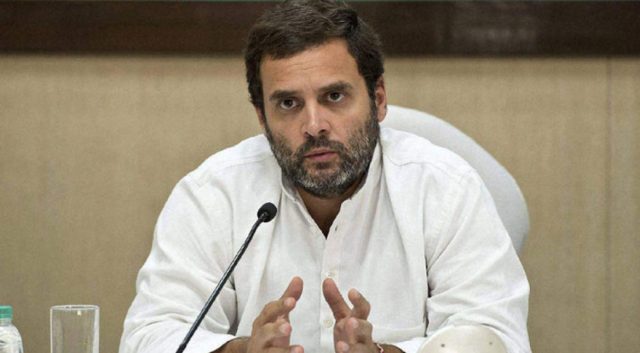
Does Rahul Gandhi suffer from an obsession with the RSS or do his political advisors believe that vituperation of the RSS is the only way to keep him relevant? Whatever the reason is, it is clear the politics of slander gives him satisfaction and it’s not difficult to understand why. The RSS has confronted his dynasty at critical junctures in Indian politics and that is why he attacks them on every occasion.
Rahul has not been alone. If one goes back in history, his parallel was Raj Narayan, a socialist in the late 1970s, who after the fall of the Janata Party government in 1979, did what Rahul is doing now. An interesting episode illustrates this point. Once in the assembly of a prestigious school, when a student mentioned that a fire had broken out in a factory in Kanpur, his peers spontaneously responded with ‘RSS ka haath hai’ (RSS was behind that). Thanks to socialists like Raj Narayan and Madhu Limaye’s repeated allegations against the RSS for all political and non-political incidents, even young boys believe they were the cause of everything bad that had happened in the country.
Coming back to Rahul Gandhi, some of his slanderous remarks against the RSS are puzzling. On May 23, he blamed the RSS for the police firing in Tamil Nadu’s Thoothukudi district, which led to the death of 13 citizens protesting against Vedanta’s Sterlite copper unit. This shows his political immaturity. There is no BJP government in the state, nor does the RSS hold any influence with the state police, nor does it have any love for Vedanta. On the contrary, during the Vedanta incident in Odisha in 2011, RSS affiliates — the Swadeshi Jagran Manch and the Bharatiya Mazdoor Sangh — were opposing its plan to plunder the natural resources in the state.
Apart from getting his facts wrong, the language and sentiment in Rahul Gandhi’s statements were dangerously provocative with an attempt to fuel Tamil parochialism. He said, “Tamils are being killed because they are refusing to bow to the RSS philosophy. The bullets of the RSS and Modi can never crush the spirit of the Tamil people. Tamil brothers and sisters, we are with you!” One wonders at his choice of words? Was it a strategy to escape from criticising the Tamil Nadu government, which could later be a prospective ally for the Congress? Perhaps.
On May 22 again, Rahul looked to stir up anger among prospective civil servants and those who had been selected through the UPSC. He tweeted, “Rise up students, your future is at risk! RSS wants what’s rightfully yours. The letter below reveals the PM’s plan to appoint officers of RSS’s choice into the Central Services, by manipulating the merit list, using subjective criteria, instead of exam rankings. #ByeByeUPSC (sic)”
Here, Rahul should note that when the UPA government was in power, it wanted a foundation course for civil servant recruits in the US to develop administrative acumen! But a foundation course in India is now unacceptable to him! Moreover, Sankalp, a coaching institute, with focus on civil services examination, has been attracting hundreds of aspirants for the last three decades. The institute is not a commercial, but a nationalist venture managed by swayamsevaks. The difference between the Congress and the RSS is that while the former perceives of RSS as an idea, the latter conceives of India as the idea.
Rahul’s doublespeak on the RSS is not only misleading, but dangerous for the nation. He has continuously accused them of being ‘anti-Dalit’, while the Harijan Sevak Sangh — an organisation formed by Mahatma Gandhi in 1932 for the welfare and empowerment of the Scheduled Castes (SC) — floundered during the Congress regime. No less than 70 per cent of SCs are landless today, thanks to the feudalism perpetuated by the party.
The tragedy of Indian discourse is that it is managed and dominated by pseudo-secular forces, unaware and uncaring of ground realities. For them, RSS is just playing power politics. This makes them blind to the realities of the RSS. The organisation runs 1,70,000 projects to empower marginalised people.
Thousands of schools, blood and eye banks, centres for leprosy patients, can be seen only by visiting tribal areas, Dalit muhallas and urban poor localities, which these intellectual middlemen and contemporary politicians do not do.
But why go by logic? There is actually no surprise in Rahul Gandhi’s vituperation of the RSS. In fact, if one looks back, his party and family have unfailingly vilified the RSS ever since India acquired freedom. Jawaharlal Nehru faced problems within the Congress and he overcame it by pointing the party towards a common ‘enemy’. He accused the RSS of having a “reactionary, unprogressive, communal and fascist ideology” and then used it as a tool to defeat rivals by equating them with the organisation. For instance, P.D. Tandon, the then elected party president, was forced to quit. Indira Gandhi, too, faced popular resentment and used coercion against the RSS to perpetuate her undemocratic rule. Rajiv Gandhi faced agitation on the Bofors deal and it was but natural for him to confront the RSS. Rahul Gandhi, too, is following in their footsteps, but unlike his predecessors, he has no alternative to offer. As a result, his anti-RSSism is just a tool he uses to survive as a political actor within a party which lacks both vision and organisation.
– Rakesh Sinha
The author is founding Honorary Director of India Policy Foundation, a Delhi-based think tank. Views expressed are personal.
Courtesy: DNA














